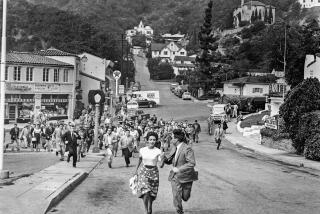MOVIE REVIEW : GETTING INTO ‘MISCHIEF’ IN THE ‘50S
- Share via
Do we really need yet another coming-of-age-in-the-’50s movie, especially one that has nothing new to reveal about Eisenhower-era youth?
That’s the question “Mischief” (citywide) raises. Neither terrible nor outstanding, it’s the kind of middle-of-the-road picture that’s hard to remember a week after seeing it.
Like so many before it, “Mischief” is steeped in small-town middle-America nostalgia, relying heavily on the cars and popular music of the time.
There’s the nice, virginal all-American high school boy (Doug McKeon), with whom we are supposed to identify; the great-looking, confident but actually troubled kid (Chris Nash) from the big city to whom McKeon looks for advice on how to lose that virginity and the high school glamour girl (Kelly Preston) who’s not quite the prize McKeon thinks she’d be.
Then there’s the demure girl (Catherine Mary Stewart) attracted to Nash but pushed by her parents to stick with the town’s snotty, bullying rich boy (D. W. Brown)--why any girl would spend 10 seconds with him, or why her parents would want her to, defies comprehension. By golly, there’s even the bright girl (Jami Gertz) who blossoms once her braces and glasses come off.
Under Mel Damski’s direction, each of the these young actors is capable, although most appear to be somewhat beyond their high school years. But writer-executive producer Noel Black has not written roles with enough substance to keep them from seeming more stereotypes than archetypes.
Filmed in the small town of Nelsonville, Ohio, and its environs, “Mischief” has a pretty good surface authenticity, although it’s hard to imagine there would be a black policeman at that place and time (1956).
Amid evident concern for period atmosphere, there’s some wanton car-smashing that surely no young person of that era would have dreamed of getting away with (and it seems a weak resolution for the film, besides), and a love scene, shrewdly tempered with humor, that earns “Mischief” its R and definitely could not have been included in any ‘50s film. Yet it provides “Mischief” with its most deft touch: The girl, before taking the boy to her bed, turns her teddy bear to the wall.
More to Read
Only good movies
Get the Indie Focus newsletter, Mark Olsen's weekly guide to the world of cinema.
You may occasionally receive promotional content from the Los Angeles Times.










